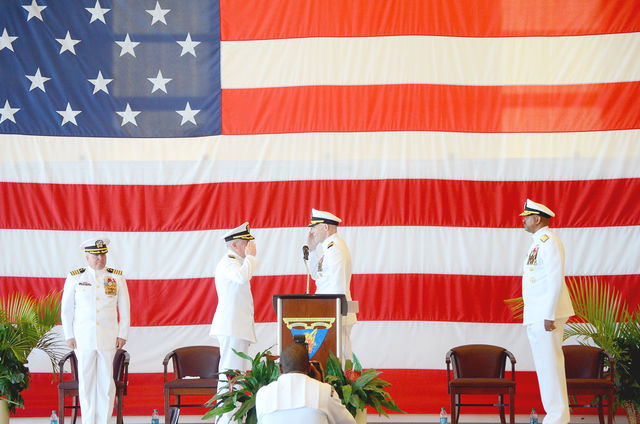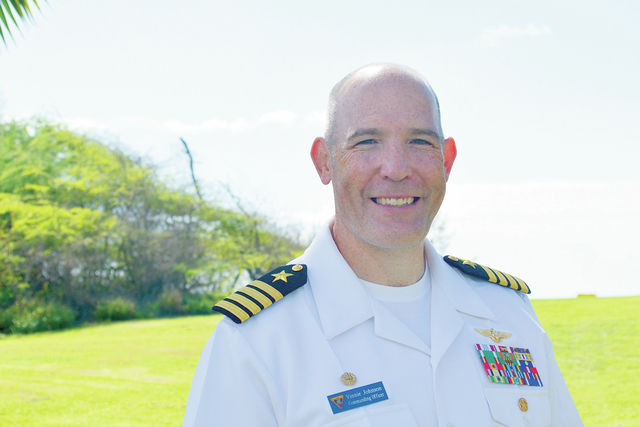Vincent Johnson


BARKING SANDS — It’s been four months since the change of command ceremony at Pacific Missile Range Facility, when Capt. Vincent Johnson relieved Capt. Bruce Hay as commanding officer of the base.
Johnson was teaching strategy and policy at the Naval War College in Newport, Rhode Island, when he accepted command at PMRF and moved his family to Kauai.
Now, he is settling into island life with his wife Marcia and their two sons: 7-year-old Henry and 20-month-old Sam.
Johnson took some time on a sunny Kauai afternoon to sit with The Garden Island at the base’s restaurant, Shenanigans, and share a bit about himself.
TGI: What’s your background and why did you choose Kauai?
I was born in Wisconsin and grew up in Michigan. I went to the Naval Academy, and from there I started off flying helicopters. I’m a pilot.
I did a full junior officer tour and transitioned into carrier aviation and I flew what Bruce (Hay) flew, the Prowler, the EA-6B, off the carriers. The follow-end to the Prowler is a jet called the Growler, the EA-18G. It’s a Super Hornet that does the electronic attack.
So I was a Prowler executive officer and then the squadron that I was commanding, we got the new aircraft during my command tour. That was kind of fun.
The bulk of my career has been in the Pacific Northwest, but I’ve also been in Rhode Island, the (Washington) D.C. area. I was in Florida for my flight training and my first tour.
I was at the war college teaching when I was selected for major command and I was offered two choices: Misawa, Japan, or Kauai. Everyone said, “If you like Whidbey Island, you’d like it.” But I called Bruce — I knew him from Whidbey — and he said, “Sell your arm to come out here.”
The interesting thing is my first three commands have all been on islands; I’ve been at Whidbey Island and Rhode Island. So, this is the third island in a row that I’ve lived in, and it’s the first one without a bridge to get off of it. My sons have never not lived on an island.
My wife is from Washington state and we really like that area, but Kauai is quickly climbing to the top of the list. She lived on the eastern side of Washington state, which really looks a lot like Kauai’s Westside so Marcy’s like, “I’m home.” But it’s warmer here.
TGI: What are some of your life philosophies?
One of my favorite words is stewardship. The bottom line is there’s no reason to be in Kauai unless you’re a steward of our nation’s security. Why else would our military be here? We have to be good stewards, so not only the natural and cultural resources but our community. I’ve seen places where the military comes in and ruins the relationship. We’re too big of an organization to be careless about what we do and say.
My two favorite words right now are pono and malama. When I was a squadron C.O. (commanding officer), I said we can worry about the squadron, but let’s worry about if everybody’s a good person so all together we’ll do good things. Personal excellence is important: do your best, do the right thing and take care of each other. That’s what pono means: doing the right thing when nobody is looking.
I like that the Hawaiians have this awesome knack for having a small word mean a very complicated thing. Malama, that’s another one — meaning protecting people and being a good steward.
TGI: What’s your goal in taking over command and how has the transition panned out?
When a pilot is flying and it’s going well and the guy hands over the controls for a moment, the last thing you want to do is start doing a lot of jerking around.
They say, “The plane’s trimmed up.” When the plane’s trimmed up, be light on the controls.
I think Bruce left the command heading in the right direction, so I’ve been light on the controls. I want to continue what he did with the community engagement. I got compete buy-in from my bosses with the MWR (Morale, Welfare and Recreation guest card program) access program.
Someone might say allowing people on base is a security risk, but the closer I bring the community together, the more access I can provide. The last thing I want is the people on the island wondering what’s happening behind the fence.
That’s another aspect to stewardship — because of the support we get from the community we have an obligation to try to make sure that there are jobs here and the families that do it.
TGI: What’s your philosophy on the environment?
I think you can 100 percent be pro-environment and pro-military. I wouldn’t be in the military if didn’t think so. I’m a member of Surfrider and I’ve been a member for years. I’m not as active as I could be. But I think that around here, more gets done with a handshake and a smile and I want to get out in the surf break and talk to people.
Everything comes at a cost and that’s why we have to be a good steward, but I have little kids and I love being in the water. I dive, in fact.
Dark skies, that’s another thing. Other people can’t say, “Everybody turn off your lights,” but I can here, and it’s a big deal. You should see the pictures of the base with all the lights turned off come September. In the end it doesn’t cost us anything and it’s been very successful.
If people want to have open discussions, I’m more than happy to do it. I really don’t want people to be outside of the fence, looking over and wondering what’s’ going on.
TGI: What are some of your hobbies?
My garage is my gear closet and I’ve got a lot of hobbies. I like anything outdoors — camping and climbing. Being outdoors is kind of my get-well point, and I spend a lot of time chasing around a 20-month-old, which is fun.
I surf, but I’m not a huge surfer. With the temperatures in the Pacific Northwest, I took up paddle boarding, but now I’d like to get back to surfing and there’s no shortage of people that invite me to go. I have kite boarding stuff, too, and it’s been a while so I’d like to do that. I don’t know if I’m ready for Kauai conditions yet, though.
I was recruited (to the Naval Academy) for football, but I found out I wasn’t big enough to play so I did rugby in college. I played rugby for the first 10 years I was in the military, until basically 911, and with our deployments; we got too busy to continue.
I also like history, and being a strategy and policy guy, there’s a lot of history in it. This place is all history and culture. It’s so cool to get a chance to talk to the Robinsons and go to Niihau.
I was a physics major at the academy and I graduated with a degree in physics, but I don’t think anyone was knocking on the doors asking me to work as a physicist. When I was a student at the war college, the history stuff was really interesting.
I love going to Hanapepe on Fridays and just talking to people and sitting around and listening to music. If you’re around the house, there’s alt-country playing — usually Zach Brown. I can listen to Hawaiian music all day and sometimes I need some rock and roll. I’m all over.
I play the guitar poorly. I’m at three chords and a dream, but I have made the promise to the mayor that I’d accompany him because he loves to sing. I’m not a singer but at some point he’ll sing “Pono‘i” and I’ll accompany him. I’m not afraid to get around and play — just don’t ask me to sing.
